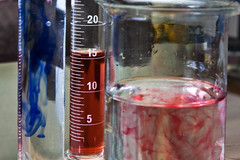 Today's DAD is an 'oldie but a goodie'. In Hughey v. Department of Motor Vehicles (1991) 235 Cal.App.3d 752, 757–758, a motorcyclist involved in an accident was arrested for driving under the influence. He was uncooperative and refused medical care. Although no head injuries were observed by the arresting officer or ambulance or fire personnel, he was “ ‘in and out,’ meaning he went from responsive to the irrational, and ‘up and down,’ meaning he would go from the calm to the belligerent.” When read the chemical test admonition, the officer was not sure the motorcyclist understood it and the motorcyclist made a comment that made no sense to the officer. After his release from jail, he was hospitalized and treated for a skull fracture; his hospital records were introduced at the license revocation hearing.
A neurologist testified the motorcyclist had suffered a serious head injury during the accident, which would account for his bizarre combative behavior and would have made it difficult to have understood the officer's admonition and the significance of his refusal to submit. The neurologist also opined it was unlikely that alcohol caused the behavior.
Today's DAD is an 'oldie but a goodie'. In Hughey v. Department of Motor Vehicles (1991) 235 Cal.App.3d 752, 757–758, a motorcyclist involved in an accident was arrested for driving under the influence. He was uncooperative and refused medical care. Although no head injuries were observed by the arresting officer or ambulance or fire personnel, he was “ ‘in and out,’ meaning he went from responsive to the irrational, and ‘up and down,’ meaning he would go from the calm to the belligerent.” When read the chemical test admonition, the officer was not sure the motorcyclist understood it and the motorcyclist made a comment that made no sense to the officer. After his release from jail, he was hospitalized and treated for a skull fracture; his hospital records were introduced at the license revocation hearing.
A neurologist testified the motorcyclist had suffered a serious head injury during the accident, which would account for his bizarre combative behavior and would have made it difficult to have understood the officer's admonition and the significance of his refusal to submit. The neurologist also opined it was unlikely that alcohol caused the behavior.
The Hughey court noted, a “self-induced condition rendering the driver incapable of understanding and refusing to submit to a test, particularly if the condition results from alcohol consumption, does not excuse failure to take a test.” (see cases cited therein.) However, it concluded the evidence supported the finding that the motorcyclist was rendered incapable of refusing to submit to a chemical test by reason of his head injury and that alcohol was not a cause his mental state following the accident.
Looking for a Top California DUI DWI Attorney?
Visit Americas Top DUI and DWI Attorneys at http://www.1800dialdui.com or call 1-800-DIAL-DUI to find a DUI OUI DWI Attorney Lawyer Now!


![Reblog this post [with Zemanta]](http://img.zemanta.com/reblog_e.png?x-id=f391e3ce-eae5-4e5a-9470-df488ed1e391)

![Reblog this post [with Zemanta]](http://img.zemanta.com/reblog_e.png?x-id=28bc332e-b675-4e8b-9af6-97fdc14da560)